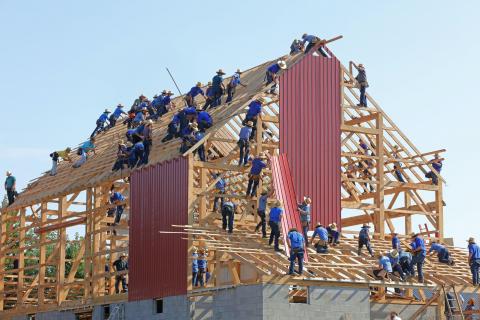
I remember a story about ancient Hun warrior and military leader Atila.
He was once asked by their military ally - the commander of the Roman army to lie down in an ambush and wait for a signal to attack.
An ordinary general would have waited for an envoy to deliver concise orders or an obvious sign.
Well, it wasn't the case with Atila; his gut showed the exact moment through a fierce battle when to charge. Apparently, he had advanced with His armies right when Roman had sent out an envoy with orders and was about to raise a banner as a sign for Atila.
Atila and His ally - Roman general, had perfect chemistry, one a kind, letting them achieve a common goal with a clear understanding of partners thoughts.
Atila was later praised for His courageous actions and boldness: "If we had more generals like Him, we'd conquered the whole world already."
Wouldn't you love to possess such a great gang of colleagues who wouldn't wait for a clear and distinctive command, sign or direction? Or, to put it in other words, who wouldn't require a direct order. Instead, they would look straight in your eye and say: "I got you".
That's a dream; nevertheless, there are clearly practical ways to build great chemistry within your team.
Ask yourself: How well do you know your teammates? I am confident you could clearly retell their skillsets: Jane knows this well, Marting that well. But that's not the question I am asking.
Let me rephrase and repeat: "How well do you know your team?"
When was the last time you went out - altogether? I bet would be challenging during the pandemic lockdown; nevertheless, there are alternative ways to "be out" without leaving your living room. Or, in other words - remind me when you had a conversation on matters other than business as usual?
Still, you have options to:
- Organise virtual games,
- Host open-minded sessions; like drama school,
- Public speaking contests on Fridays.
Anything that challenges the daily mundane corporate setup. Anything that would switch them off their main work and duties and expose their true personalities, strengths and weaknesses.
It looks good on the paper; what are practical examples? Some I have already given to you, here is the full list of events and venues:
- Regular out of work activities,
- Games (virtual, on-site if permitted),
- Personality and personal growth workshops or mastermind groups,
- Contests and competitions.
You have the ultimate freedom to choose and perhaps test out multiple options; the initiative must come from you - the leader of your squad.
Still thinking that's just good on the paper, and there are now real-life stories?
As a side note;
- if you come from a technology world, perhaps you may recognise the potential of coding kata, guilds or hackathons. I have seen organisations bringing people from outside and letting them help to solve major programming issues.
- If you come from the product development world, consider letting your staff develop anything they like on Fridays. That's the exact story of how Gmail as a product evolved.
And, I can continue for days ...
Team chemistry is subtle and difficult to grasp, yet it is so powerful that any sports coach knows what to do on their first day at the job. A hidden gem worth to be yearning for!
